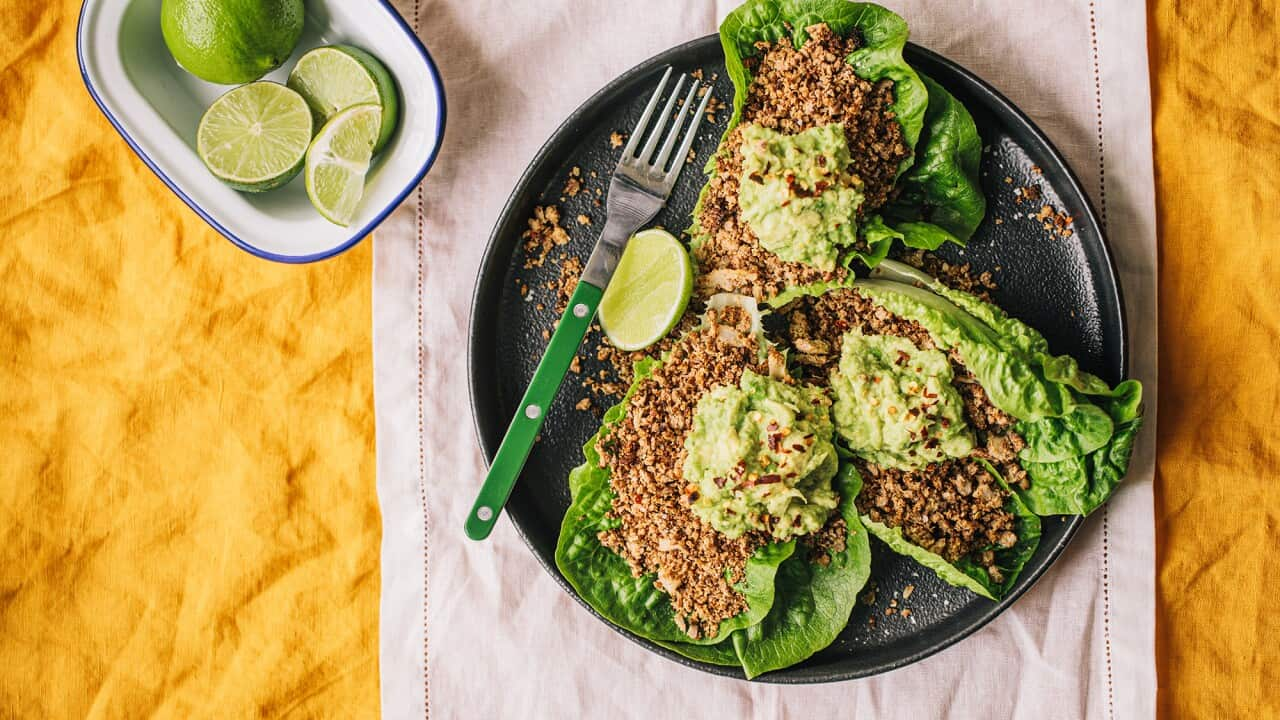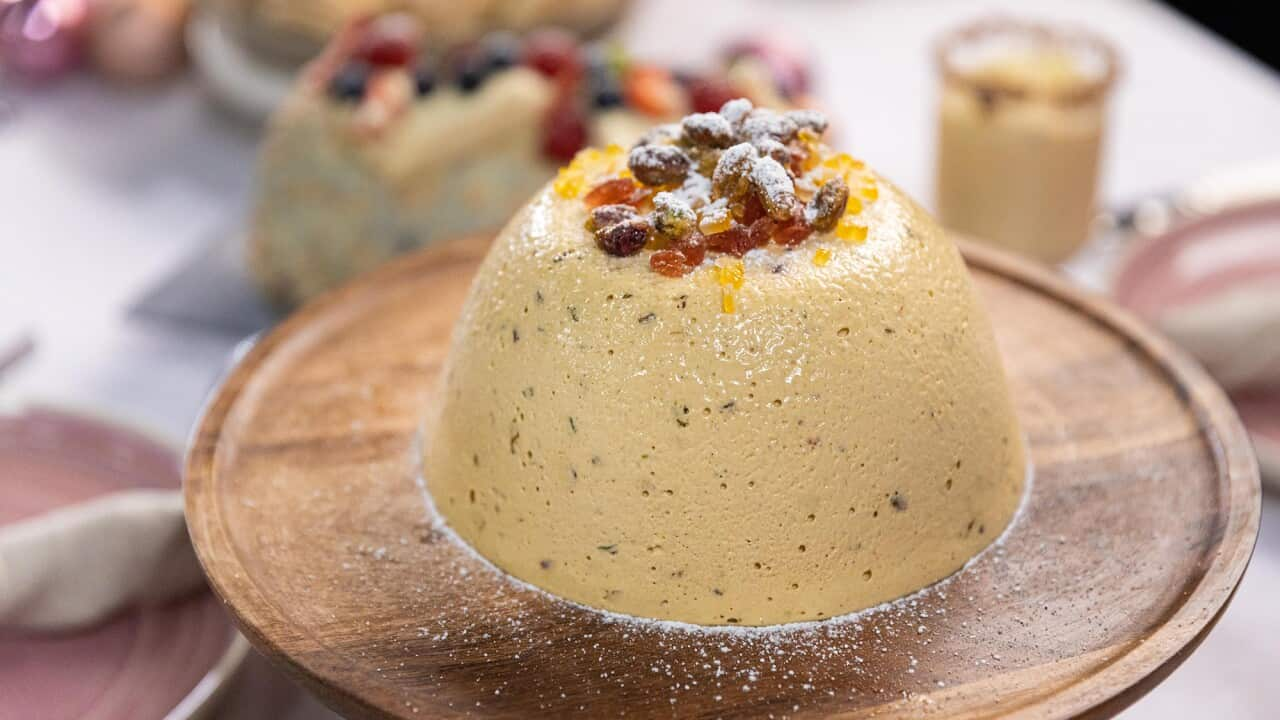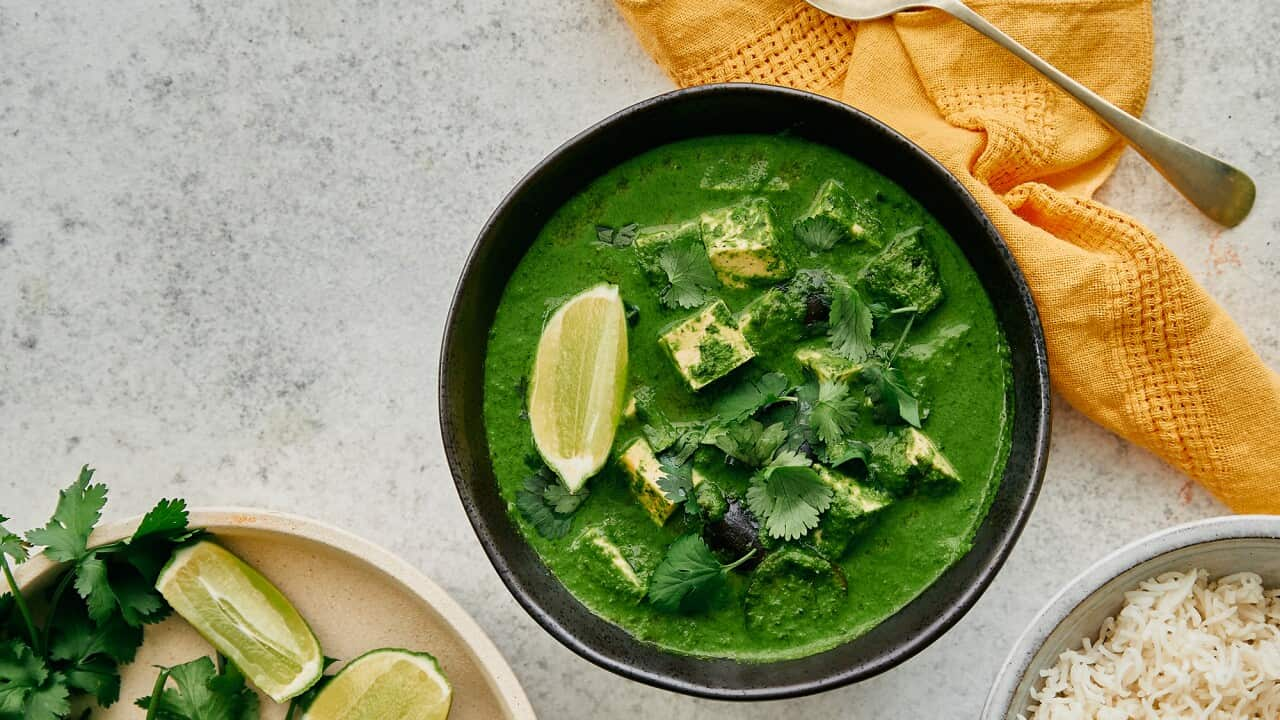serves
6
prep
25 minutes
cook
55 minutes
difficulty
Ace
serves
6
people
preparation
25
minutes
cooking
55
minutes
difficulty
Ace
level
Ingredients
- 1 bunch rhubarb
- 100 g caster sugar
- 1 tsp rosemary leaves
- 1 bay leaf
- 3 pieces lemon peel
Black pepper custard
- 1½ tsp black peppercorns
- 300 ml milk
- 250 ml pouring cream
- 1 vanilla pod, split and seeds scraped
- 1 bay leaf
- ¼ tsp river salt
- 5 egg yolks
- 100 g caster sugar
Soufflé
- 120 g caster sugar
- 90 g egg whites
- 1 pinch salt
You will need a sugar thermometer, a standing mixer with a whisk attachment, and a friend.
Standing time 30 minutes
Instructions
Rhubarb jam
Cut the rhubarb into 1 cm slices, wash, drain and then place in a bowl with the sugar, herbs and lemon peel. Give it a good stir with a spoon to completely coat the rhubarb. Set aside for 30 minutes.
Preheat the oven to 170°C. Place the rhubarb in a baking dish. Cover the dish with foil and cook for 20 minutes.
Transfer the rhubarb to a small saucepan. Strain off 60 ml of the cooking liquid through a fine strainer and set aside. Pour the remaining cooking liquid into the pan with the rhubarb and cook over medium heat, stirring occasionally, for 2 minutes until the rhubarb breaks down. Very carefully remove the lemon peel and bay leaf without burning yourself and discard. Set aside the rhubarb jam.
Custard
Lightly crush the peppercorns in a mortar and pestle and place in a saucepan with the milk, cream, vanilla pod and seeds, bay leaf and salt. Bring to the boil and remove from the heat.
In a bowl, whisk the egg yolks and sugar until just combined.
With an extra pair of hands (hello, friend), strain the milk mixture into the egg mixture, whisking as you go.
Pour the custard into a clean saucepan and cook over low heat, stirring constantly, for about 10 minutes until thickened. Set aside in a warm spot.
Soufflé
Place the sugar and reserved 60 ml rhubarb syrup in a small pan and stir to combine. Use a pastry brush dipped in water to clean any sugar that has stuck to the inside of the pan above the level of the mixture, to help prevent the mixture caramelising. Place the pan on low heat.
Place egg whites in bowl of a standing mixer with a pinch of salt, and mix on medium speed.
Now comes the tricky bit - you want to boil the sugar syrup on the stove until it reaches 116°C (this is where you'll need the sugar thermometer), at which stage you want your egg whites to be whisked to soft peaks. This requires a little bit of co-ordination and luck.
Once you’re at this stage, carefully yet swiftly pour the sugar syrup into the egg whites with the mixer still going on medium speed. Aim the saucepan so the sugar syrup pours in near the edge of the bowl.
Once all the syrup is in, while still whisking, have a careful feel of the outside of the bowl - it should feel quite hot. You need to keep whisking for about 10 minutes or until the bowl cools to a temperature that you can comfortably touch, and the eggwhite mixture should be fairly stiff and looking silky.
Meanwhile, butter 6 small moulds or heatproof bowls. Place a portion of rhubarb jam in the bottom of each one.
Divide the meringue evenly between the moulds then, using the back of a spoon, gently press on the top of the meringue and flick up to create little peaks. Do this as much as you desire over all the soufflés.
The soufflés will keep out of the fridge for a good few hours until you are ready to cook, or in the fridge overnight.
When you are ready, bring the soufflés to room temperature first if they have been in the fridge. Preheat the oven to 200°C. Bake for 15 minutes. Reheat the custard, if necessary, and place in a jug.
Serve soufflés straight from the oven with the custard on the side.
Photography by Benito Martin. Styling by Jerrie-Joy Redman-Lloyd. Bowl on grey dish from Mud Australia. Bowl in front from The Country Trader. Smallest bowl in centre from The Fortynine Studio.
Cook's Notes
Oven temperatures are for conventional; if using fan-forced (convection), reduce the temperature by 20˚C. | We use Australian tablespoons and cups: 1 teaspoon equals 5 ml; 1 tablespoon equals 20 ml; 1 cup equals 250 ml. | All herbs are fresh (unless specified) and cups are lightly packed. | All vegetables are medium size and peeled, unless specified. | All eggs are 55-60 g, unless specified.









